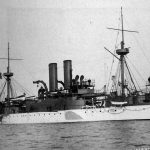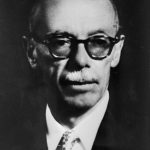 1898 – The USS Maine warship explodes and sinks in Havana’s port of Cuba, killing 275 people. This event causes the United States to officially declare war on Spain. The war led to the emergence of U.S. dominance in the Caribbean region and resulted in the acquisition of Spanish property in the Pacific. This led to U.S. involvement in the Philippine Revolution and eventually to the Filipino-American War.
1898 – The USS Maine warship explodes and sinks in Havana’s port of Cuba, killing 275 people. This event causes the United States to officially declare war on Spain. The war led to the emergence of U.S. dominance in the Caribbean region and resulted in the acquisition of Spanish property in the Pacific. This led to U.S. involvement in the Philippine Revolution and eventually to the Filipino-American War.
 1923 – Greece becomes the last European country to adopt the Gregorian calendar. The Gregorian calendar is the calendar used in most of the world. It was named after Pope Gregory XIII, who introduced it in October 1582. Calendar spaces jump years to make the average year 365 days, approximating the tropical year defined by the Earth’s revolution around the Sun.
1923 – Greece becomes the last European country to adopt the Gregorian calendar. The Gregorian calendar is the calendar used in most of the world. It was named after Pope Gregory XIII, who introduced it in October 1582. Calendar spaces jump years to make the average year 365 days, approximating the tropical year defined by the Earth’s revolution around the Sun.
 1933 – In Miami, Giuseppe Zangara attempts to assassinate US President-elect Franklin D. Roosevelt. During a nighttime speech from Roosevelt to Miami, Florida, Zangara fired five shots with a weapon he had purchased a few days earlier but instead wounded Chicago Mayor Anton J. Cermak, who dies from the wounds received on March 6, 1933. This would be his own assassination attempt on President Roosevelt.
1933 – In Miami, Giuseppe Zangara attempts to assassinate US President-elect Franklin D. Roosevelt. During a nighttime speech from Roosevelt to Miami, Florida, Zangara fired five shots with a weapon he had purchased a few days earlier but instead wounded Chicago Mayor Anton J. Cermak, who dies from the wounds received on March 6, 1933. This would be his own assassination attempt on President Roosevelt.
 1948 – Born in Pagarusha in the municipality of Malisheva, Kosovo, Eqrem Kryeziu. He is a politician and professor of Albanian literature, he received his doctorate in philological sciences in 2007 at the University of Prishtina. After the elections of 1998, he was elected a member of the presidency, while after the elections of 2006, he was elected the first deputy chairman of the LDK in Prishtina. Otherwise, since 1972 Eqrem Kryeziu was engaged in education. In 2006 he was the mayor of Prizren
1948 – Born in Pagarusha in the municipality of Malisheva, Kosovo, Eqrem Kryeziu. He is a politician and professor of Albanian literature, he received his doctorate in philological sciences in 2007 at the University of Prishtina. After the elections of 1998, he was elected a member of the presidency, while after the elections of 2006, he was elected the first deputy chairman of the LDK in Prishtina. Otherwise, since 1972 Eqrem Kryeziu was engaged in education. In 2006 he was the mayor of Prizren
 1951 – Born in Uxbridge, Jane Seymour. Seymour is a British-American actress best known for her performances in James Bond Live and Let Let ‘s Somewhere In Time, East of Eden, The Scarlet Pimpernel, Onassis, The Richest Man in the World, War and Remembrance, La Revolution française, starring Marie Antoinette and Wedding Crashers. In 2000, she was appointed an Officer of the Order of the British Empire.
1951 – Born in Uxbridge, Jane Seymour. Seymour is a British-American actress best known for her performances in James Bond Live and Let Let ‘s Somewhere In Time, East of Eden, The Scarlet Pimpernel, Onassis, The Richest Man in the World, War and Remembrance, La Revolution française, starring Marie Antoinette and Wedding Crashers. In 2000, she was appointed an Officer of the Order of the British Empire.
 1972 – Jose María Velasco Ibarra, Ecuador’s President for the fifth time, suffers just as many coups from the armed forces of his country. Ibarra was an ardent populist who did not have an official party organization. On the contrary, it was his populist rhetoric that drew enthusiastic followers, as he presented himself as the advocate of the poor and the lower strata of the population.
1972 – Jose María Velasco Ibarra, Ecuador’s President for the fifth time, suffers just as many coups from the armed forces of his country. Ibarra was an ardent populist who did not have an official party organization. On the contrary, it was his populist rhetoric that drew enthusiastic followers, as he presented himself as the advocate of the poor and the lower strata of the population.
 1989 – During the Soviet-Afghan War, the Soviet Union officially announces the withdrawal of all its troops from Afghanistan. The war lasted for a decade from 1979 until 1989. The USSR lost more than 20,000 troops in this country, leaving behind thousands of pieces of its own military logistics arsenal. About 2 million civilians and soldiers were killed on the Afghan side. After the defeat of this conflict, the Soviet Union disintegrated.
1989 – During the Soviet-Afghan War, the Soviet Union officially announces the withdrawal of all its troops from Afghanistan. The war lasted for a decade from 1979 until 1989. The USSR lost more than 20,000 troops in this country, leaving behind thousands of pieces of its own military logistics arsenal. About 2 million civilians and soldiers were killed on the Afghan side. After the defeat of this conflict, the Soviet Union disintegrated.
 1991 – The Visegrad Agreement is signed by the leaders of Czechoslovakia, Hungary, and Poland, establishing cooperation to move towards free-market systems. The Visegrad Group is a cultural and political alliance of the Czech Republic, Slovakia, Hungary, and Poland, which are members of the EU and NATO, for the purposes of military, cultural, economic and energy co-operation.
1991 – The Visegrad Agreement is signed by the leaders of Czechoslovakia, Hungary, and Poland, establishing cooperation to move towards free-market systems. The Visegrad Group is a cultural and political alliance of the Czech Republic, Slovakia, Hungary, and Poland, which are members of the EU and NATO, for the purposes of military, cultural, economic and energy co-operation.
 2002 – Died at the age of 87, Howard K. Smith. Smith, was an American journalist, radio reporter, television anchorman, political commentator, and film actor. He was one of the original members of the war correspondent team known as the Murrow Boys. Among the honors Smith received over the years were DuPont Awards, Sigma Delta Chi, and an award from the American Jewish Congress in 1960.
2002 – Died at the age of 87, Howard K. Smith. Smith, was an American journalist, radio reporter, television anchorman, political commentator, and film actor. He was one of the original members of the war correspondent team known as the Murrow Boys. Among the honors Smith received over the years were DuPont Awards, Sigma Delta Chi, and an award from the American Jewish Congress in 1960.






